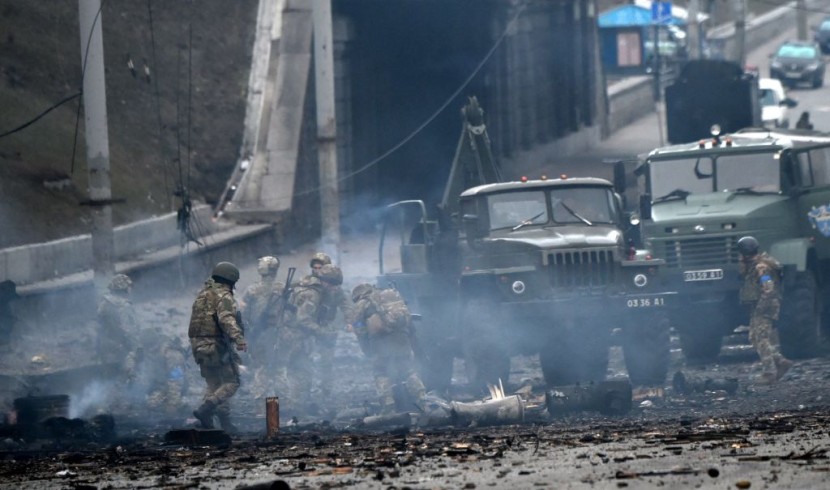
Ukraine has executed a daring offensive on the Crimean Peninsula, targeting Russian naval assets and missile installations.
This audacious move, however, warrants a closer look, as it carries significant geopolitical implications and highlights the evolving dynamics of the ongoing Ukraine-Russia conflict, according to Reuters.
Ukraine's Audacious Offensive in Crimea
Oleksandr Musiienko, a Kyiv's Centre for Military and Legal Studies expert, articulated Ukraine's strategic objectives behind these attacks. He outlined two primary goals: to establish dominance in the north-western Black Sea and to disrupt Russian logistical support for their defense lines in the south, particularly near Tokmak and Melitopol.
These objectives underscore the interconnected nature of military operations in Crimea with Ukraine's broader counteroffensive in the south. Wednesday marked a pivotal moment when long-range cruise missiles, reportedly supplied by the UK and France, struck Russia's Black Sea fleet at its home port of Sevastopol.
Satellite imagery of the aftermath at the Sevmorzavod dry dock repair facility revealed two vessels in ruins. The British Ministry of Defence confirmed the devastating impact, asserting that the large amphibious landing ship, the Minsk, had almost certainly been functionally destroyed.
Equally consequential was the damage inflicted on one of Russia's Kilo-class diesel-electric submarines, the Rostov-on-Don, responsible for launching Kalibr cruise missiles, which had likely suffered catastrophic damage, The News reported.
Moreover, the dry docks, crucial for maintaining the entire Black Sea fleet, were expected to be out of commission for many months. This development severely blows Russia's naval capabilities in the Black Sea region.
On Sunday, reports of explosions in the Crimean city of Sevastopol added to the intrigue. Citing intelligence sources, Ukrainian media outlets asserted that these explosions resulted from a joint operation conducted by Ukraine's GUR military intelligence and the country's Navy.
In contrast, Moscow-installed governor Mikhail Razvozhayev dismissed these claims, assuring the international community that everything remained calm in Sevastopol, Crimea's largest city. Razvozhayev went further to deny any damage caused when Russian air defenses reportedly downed three Ukrainian drones in the area on Sunday.
He attributed any smoke observed in the South Bay area to harmless aerosol camouflage utilized by the Black Sea Fleet and cautioned that "our enemies today will try with all their might to pass it off as a 'victory,' as per BBC.
Recapturing Klishchiivka in Ongoing Counteroffensive
Meanwhile, the military of Ukraine said on Sunday that it had retaken the little village of Klishchiivka. This is the second settlement to return to Kyiv's hands in just three days, and it represents the most significant recent advance in the country's arduous counteroffensive to push Russian soldiers from the east.
Since Russian forces took over Klishchiivka in January, the neighboring city of Bakhmut had been engaged in a protracted conflict that was eventually won by Wagner mercenaries after weeks of fighting. Almost immediately after Russian forces took control of Bakhmut in May, Ukrainian forces launched an offensive to expel Moscow's soldiers from the region to the north and south of the city.
The settlement was very much in their sights as Klishchiivka was situated on high ground and overlooked the roads leading into and out of a destroyed Bakhmut. Kyiv's troops had been sluggishly advancing on Klishchiivka in recent weeks while suffering severe losses in fierce combat.
A little more than two miles to the south, near the farming community of Andriivka, the Ukrainian military claimed on Friday that its soldiers had taken control of the area. Then, on Sunday night, as tremendous booms resounded in the background, the 80th Separate Airborne Assault Brigade published a video of soldiers holding the yellow-and-blue Ukrainian flag in front of a collapsed structure and a devastated church.
The commander of Ukraine's ground troops, Gen. Oleksandr Syrsky, swiftly reported the development, posting on Telegram that Klishchiivka had been cleared of the Russians, and President Volodymyr Zelensky praised the soldiers in his nighttime speech.
The Russian Defense Ministry, which only acknowledged fighting near Klishchiivka in a Sunday evening report, was immediately unavailable for comment, and the claims could not be independently verified. Klishchiivka's recapture could aid Ukraine in exerting pressure on the Russian forces occupying Bakhmut, which Moscow has committed resources to defend despite being reduced to ruins.
A dominating location at Klishchiivka, six miles south of the city, would enable Ukrainian artillery to target Russian soldiers entering or leaving Bakhmut more precisely, The New York Times reported.
© 2026 HNGN, All rights reserved. Do not reproduce without permission.








